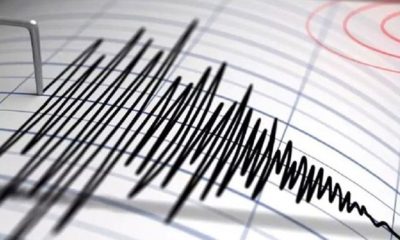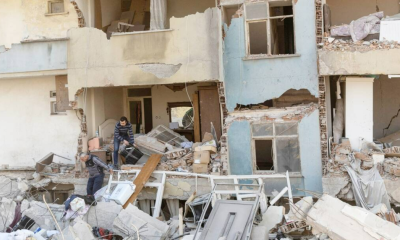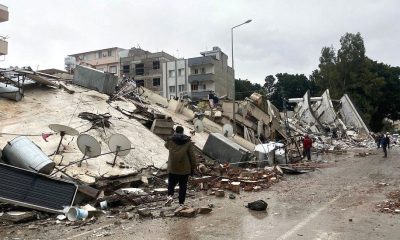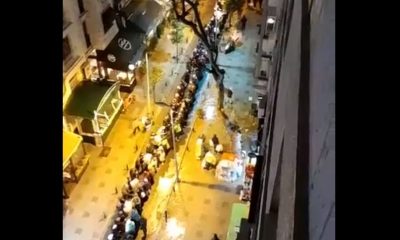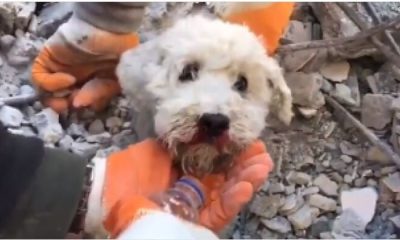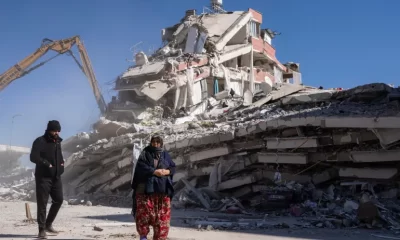Latest world news
Turkey-Syria quake: Death tolls mounts to 4,300; cities flattened, WHO fears 20,000 may have died
The confirmed death toll mounted to over 4,300 due to mammoth earthquake that tore apart Turkey and neigbouring Syria on Monday even as the World Health Organization (WHO) fears that over 20,000 may have died as rescuers continued to dig the bodies and survivors from beneath the rubble of thousands of buildings flattened by the disastrous tremors.
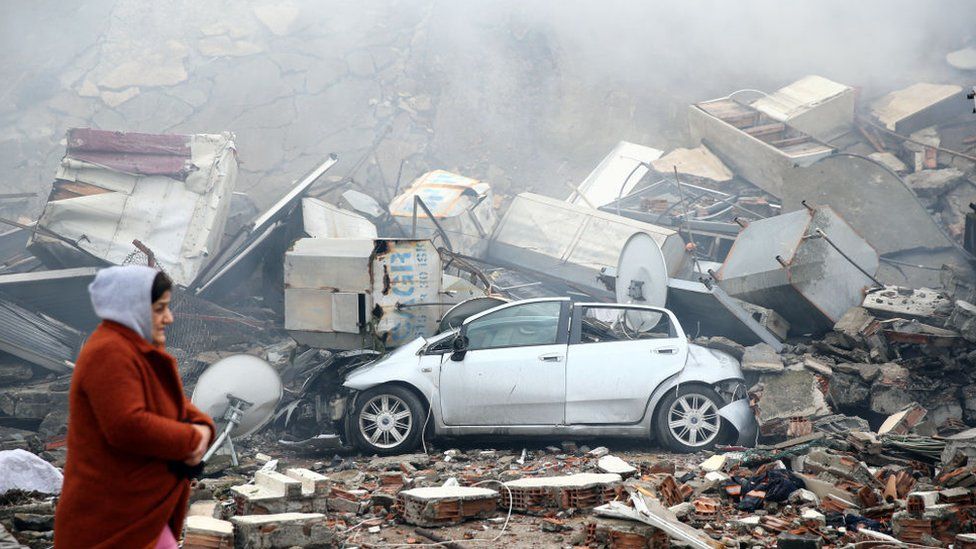
The confirmed death toll mounted to over 4,300 due to mammoth earthquake that tore apart Turkey and neigbouring Syria on Monday even as the World Health Organization (WHO) fears that over 20,000 may have died as rescuers continued to dig the bodies and survivors from beneath the rubble of thousands of buildings flattened by the disastrous tremors.
According to official reports, the confirmed death toll across the two countries has soared above 4,300 after a swarm of strong tremors struck near the Turkey-Syria border.
WHO officials fear that the toll may soar to unimaginable numbers, estimating that 20,000 people may have died.
Reports from the Turkish and Syrian disaster response teams said that over 5,600 buildings have been felled across several cities, including many multi-storey apartment blocks that were filled with sleeping residents when the first quake struck.
An AFP report quoting eyewitnesses in the Kahramanmaras city of southeastern Turkey struggled to comprehend the scale of the disaster as some believed that this was the Apocalypse- the end of days.
Turkey’s relief agency AFAD on Tuesday confirmed that there were now 2,921 deaths in Turkey alone bringing the confirmed tally to 4,365.
Reporters from news agencies and rescue workers have reported horrific scenes from ground zero as sky scrapers continue to tumble left and right with survivors clamoring for safety.
In Gaziantep, a Turkish city home to countless Syrian refugees from the war-torn countries’s decade-old civil war, rescuers picking through the rubble screamed, cried and clamoured for safety as another building collapsed nearby without warning, AFP said in its report.
As per reports, the first quake- measured at 7.8 magnitude- was so massive that it was felt as far away as Greenland, and the impact is big enough to have sparked a global response.
Dozens of nations from Ukraine to New Zealand have vowed to send help, although freezing rain and sub-zero temperatures have slowed the response.
India dispatched the batch of relief material to disaster hit Turkey, hours after an announcement made about the same by the Prime Minister’s Office.
According to the Ministry of External Affairs (MEA), the first batch of earthquake relief material to Turkey- which consists of an expert National Disaster Response Force (NDRF) search and rescue team, highly-skilled dog squads, a range of medical supplies, advanced drilling equipment, and other crucial tools required for the relief efforts- was dispatched aboard an Indian Air Force aircraft.
In the southeastern Turkish city of Sanliurfa, rescuers were working into the night to try and pull survivors from the wreckage of a seven-storey building that had collapsed.
Some of the heaviest devastation occurred near the quake’s epicentre between Kahramanmaras and Gaziantep, where entire city blocks lay in ruins as snow gathers.
On Monday, according to the US Geological Survey, the first quake hit at 4:17am (0117 GMT) at a depth of about 18 kilometres (11 miles) near the Turkish city of Gaziantep, home to around two million people.
Reports by various rescue and disaster relief agencies have estimated that over 14,000 people have been injured Turkey, while at least 3,411 people were reported injured in Syria.
Officials said three major airports have been rendered inoperable, complicating deliveries of vital aid and a winter blizzard has covered major roads into the area in ice and snow.
The Syrian health ministry reported damage across the provinces of Aleppo, Latakia, Hama and Tartus, where Russia is leasing a naval facility.
Even before the tragedy, buildings in Aleppo — Syria’s pre-war commercial hub — often collapsed due to the dilapidated infrastructure, which has suffered from a lack of wartime oversight. Officials cut off natural gas and power supplies across the region as a precaution, also closing schools for two weeks.
Read Also: Uttar Pradesh men beat up elderly man over accident, video goes viral | Watch
WHO fears death toll may soar
WHO officials fear that the toll may soar to unimaginable numbers, estimating that 20,000 people may have died.
The global agency’s senior emergency officer for Europe, Catherine Smallwood told news agency AFP that there’s a continued potential of further collapses to happen as she feared an eight-fold increase in the death count.
Smallwood said that as the per the analysis of the initial reports, the number of dead and injured will, unfortunately, increased “quite significantly” in the following weeks as the dust settle and rescue workers recover more bodies from beneath the rubble.
The WHO official warned that people who’ve lost their homes will be meeting and gathering in collective environments which poses particular risks such as overcrowding and exposure to freezing temperatures. This, she added, may put the survivors at the mercy of respiratory viruses.
Turkey is in one of the world’s most active seismic zones in the world. A 7.8-magnitude tremor in 1939 killed over 33,000 people in the eastern Erzincan province.
The Turkish region of Duzce suffered a 7.4-magnitude earthquake in 1999, when more than 17,000 people died.
Turkey earthquake: India sends first batch of relief, NDRF search team
Pakistan lifts Wikipedia ban after orders from PM Shehbaz Sharif
Latest world news
World Earth Day 2024: Google Doodle showcases aerial view of planet’s natural beauty
Google celebrated Earth Day 2024 with a special doodle featuring an aerial view of our planet’s biodiversity.
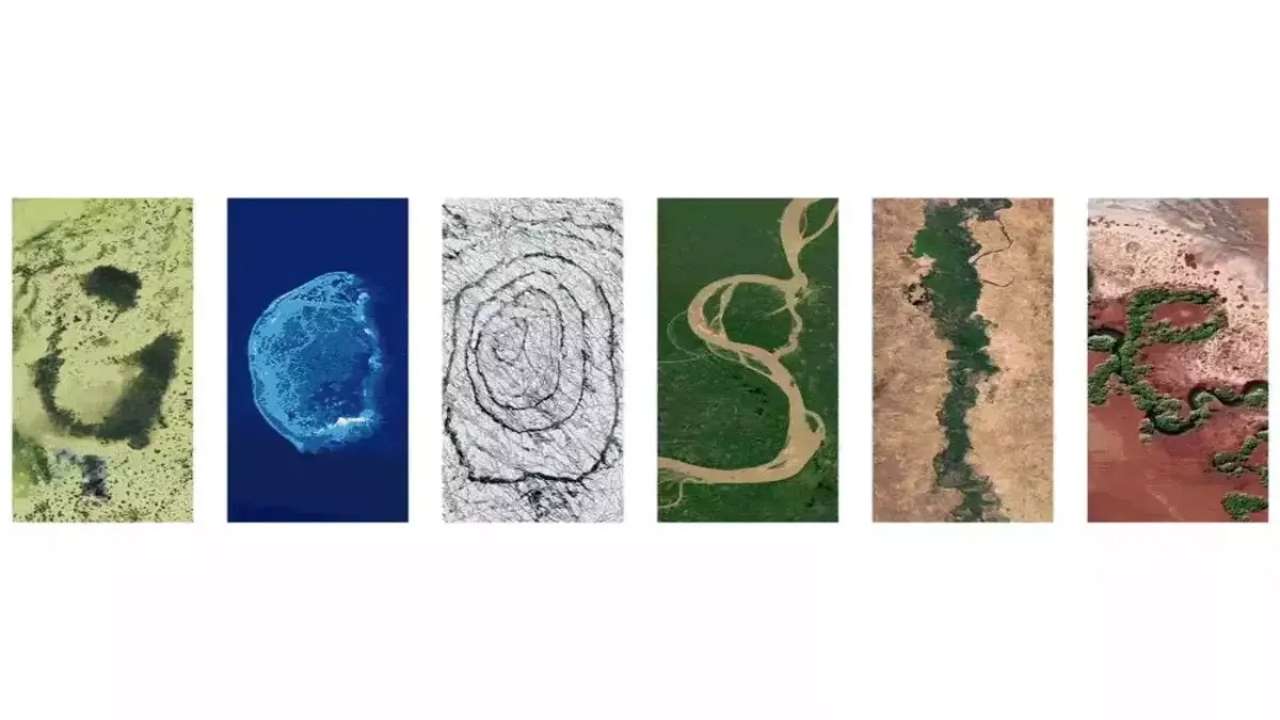
Google shared a doodle today to celebrate World Earth Day 2024, which showcased aerial photos of the planet’s biodiversity and natural beauty. Google reminded us of the importance of protecting planet earth for future generations with the help of this doodle.
The Google letters depict specific locations across the globe where people, communities, and governments work every day to help protect the planet’s natural beauty, biodiversity, and resources, according to the explanation of the annual Earth Day 2024 doodle on their website.
It said, these examples remind us that there’s much more to do to address the climate crisis and biodiversity loss, but also offer the promise of hope and optimism.
The islands of Turks and Caicos are represented by the letter “G.” The islands’ conservation efforts are concentrated on protecting important regions for biodiversity and addressing persistent environmental problems.
The largest reef in the southern Gulf of Mexico and a UNESCO biosphere reserve, Scorpion Reef National Park, is represented by the letter “O” in the Mexican flag.
The letter “O” features Iceland’s Vatnajokull National Park, which was designated as a national park in 2008 following decades of advocacy. The ecology within and surrounding the biggest glacier in Europe is safeguarded by this UNESCO World Heritage Site.
The letter “G” has the Jau National Park in Brazil on it. It is a UNESCO World Heritage Site and one of the biggest forest reserves in South America.
The Great Green Wall of Nigeria is represented by the letter “L,” and the Pilbara Islands Nature Reserves of Australia are represented by the letter “E.”
Meanwhile, Earth Day is a worldwide event that promotes protection of the environment every year. April 22 serves as a reminder of the importance of conservation efforts and sustainable practices to guarantee a healthier world and a brighter future.
The occasion inspires people across the world to come together and take action to protect the environment, strengthening our bonds with nature and promoting good change.
Latest world news
Bigg Boss 14 contestant Rahul Vaidya struggles walking in knee deep water, compares Dubai rains with Mumbai floods
Singer and TV personality Rahul Vaidya was recently stranded in the Dubai rains.

Rahul Vaidya, who was in Dubai ahead of his show which was scheduled to take place today, left the country due to heavy rains and reached Kolkata. The artist shared on social media his encounters in the UAE city, including challenges like walking through knee-deep water. Rahul provided an update regarding the heavy rainfall in Dubai on his Instagram profile.
The Bigg Boss 14 contestant revealed that he was in Kolkata and prepared to do an evening performance. Recalling the terrifying period he went through, Vaidya said there was a lot of confusion and panic in Dubai. The situation was similar to that when heavy floods hit Mumbai in 2005.
Vaiday also posted seval other images and videos of cars that were underwater and flooded roadways. The Bigg Boss 14 contestant, who shared his ordeal, claimed that even though it had just rained for two hours, the situation was dire.
In one of the video, which went viral he can be seen struggling in walking in knee-deep water. He can be also seen holding his sneakers in one hand and with other hand he was seen managing other things.
This is the result of the two hours of rain that it had, he can be heard saying in the video. Vidya also said he dosen’t believe Dubai is accustomed to a lot of rain. Everything had stopped working, he remarked.
After taking part in the first season of the singing reality show Indian Idol, Rahul Vaidya gained widespread recognition. In addition to Bigg Boss, he took part in Khatron Ke Khiladi 11.
Meanwhile, heavy rains that triggered flooding in the UAE and Bahrain, which left 18 people dead in Oman on Sunday and Monday, have paralyzed the financial hub of the Middle East, Dubai.
A lot of incoming flights were diverted from Dubai’s international airport because of the rain. At 7:26 p.m., the busiest airport in the world for foreign visitors stopped accepting new arrivals; a gradual resumption was announced for more than two hours later.
Images of planes navigating flooded tarmacs are making the rounds on social media.
According to pictures shared on social media, the flagship malls Dubai Mall and Mall of the Emirates both experienced heavy floods, while at least one Dubai Metro station had water up to the ankles.
There were several road collapses, severe flooding in residential areas, and numerous reports of leaks from windows, doors, and roofs.
Due to the unfavourable weather, schools around the United Arab Emirates were forced to close, and as more storms are predicted, the closures are anticipated to last until Wednesday. The government of Dubai allowed its staff to work remotely till this Wednesday.
Latest world news
Dubai sky turns green during storm in UAE, video goes viral
The UAE witnessed record-breaking rainfall on Tuesday and the National Centre of Meteorology recorded 254 mm of rainfall in less than 24 hrs in the Khatm Al Shakla area in Al Ain.

1 person was killed in UAE as it witnessed heavy rainfall on Tuesday, stranding commuters, flooding roads, disrupting trains and flights and resulting in water leakage from mall ceilings. The UAE witnessed record-breaking rainfall on Tuesday and the National Centre of Meteorology recorded 254 mm of rainfall in less than 24 hrs in the Khatm Al Shakla area in Al Ain. It is being said that the rainfall was the highest documented since the start of data collection in 1949.
The heavy rainfall in UAE came days after a similar situation in neighbouring Oman, where 13 people were killed in flash floods. Many parts of Oman saw torrential rains, which caused students to be trapped in buses and swept away motorists and trapped people in their homes.
Videos from Dubai circulating on social media showed widespread waterlogging on roads in Abu Dhabi, Dubai and other important cities. This left daily commuters in cars and other vehicles struggling to get back home. Dubai metro station too was seen flooded and closed.
One such video circulating on social media shows the aerial view of the city of Dubai from the top of a building. In the video the stormy winds are seen blowing over the city of Dubai. As the storm intensifies the Dubai sky turns green and ultimately gets covered by heavy rainfall. The video has gone viral on social media with more than 1.1 million views.
Another video showed water leakage from the ceilings of shopping malls, flooding the floors and destroying goods. A video which was shot in the famous Mall of the Emirates, showed pieces of ceiling falling as the rainwater gushed inside. Videos from many outlets of the Deira City Centre mall chain showed escalators being rendered unusable. Majid Al Futtaim, the company which owns the Mall of Emirates, said that the shopping complexes have been kept open and the customers are being sent away from the flooded areas.
-

 Cricket news23 hours ago
Cricket news23 hours agoTelugu superstar Mahesh Babu meets SRH captain Pat Cummins, says it is an absolute honour
-
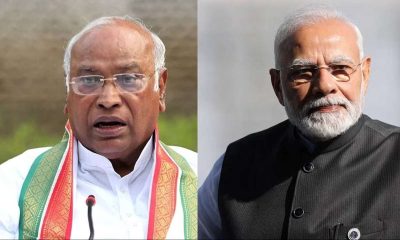
 2024 Lok Sabha Elections23 hours ago
2024 Lok Sabha Elections23 hours agoMallikarjun Kharge writes to PM Modi seeks time to explain Congress’s Nyay Patra
-
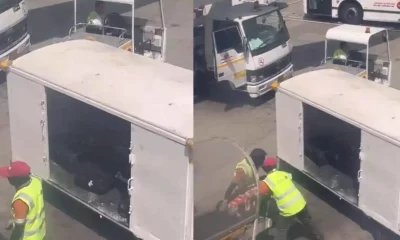
 Trending22 hours ago
Trending22 hours agoSocial media user shares video of Air India ground staff throwing expensive musical instruments, video goes viral
-
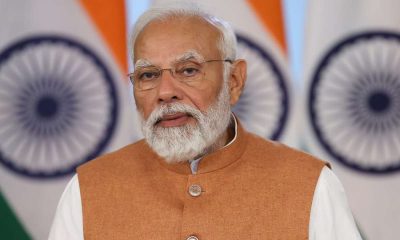
 2024 Lok Sabha Elections7 hours ago
2024 Lok Sabha Elections7 hours agoPM Modi calls for high voter turnout in second phase of Lok Sabha elections 2024, says your vote is your voice
-

 India News6 hours ago
India News6 hours agoSalman Khan house firing case: NIA interrogates arrested shooters Sagar Pal, Vicky Gupta for three hours
-
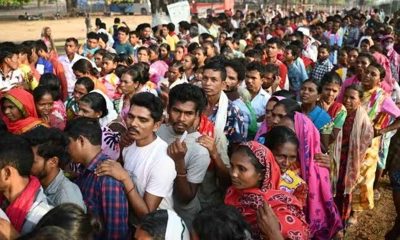
 2024 Lok Sabha Elections1 hour ago
2024 Lok Sabha Elections1 hour agoLok Sabha election 2024: Nearly 50% voter turnout recorded in second phase till 3 pm
-
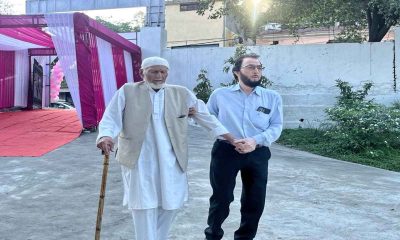
 2024 Lok Sabha Elections4 hours ago
2024 Lok Sabha Elections4 hours agoLok Sabha elections 2024: 102-year-old man walks to polling booth to cast his vote in Jammu

